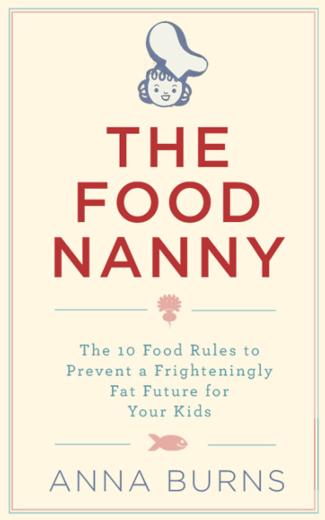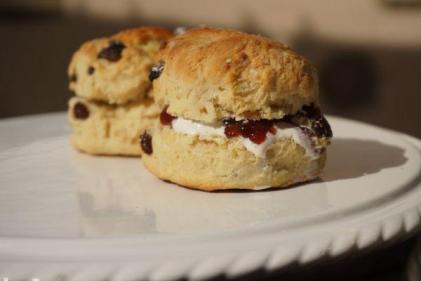 Here at MummyPages, we were very lucky to get our hands on a copy of ‘The Food Nanny: The 10 Food Rules to prevent a Frighteningly Fat Future for your Kids.’ This book is an essential read for every parent and features 10 rules to follow to teach your children to be happy, healthy eaters, fitter, active and full of beans. There are lots of yummy healthy recipes scattered throughout this clever little book. If you follow the rules contained within its pages, this book guarantees to teach you how to retrain your children’s attitude towards foods. Anna Burns is a nutritionist and mum of four who graduated from Trinity College and UCC with a Masters in nutrition and has since then amassed over seventeen years of experience in the field of nutrition so we were thrilled when she very kindly agreed to answer some of our questions especially for our mums!
Here at MummyPages, we were very lucky to get our hands on a copy of ‘The Food Nanny: The 10 Food Rules to prevent a Frighteningly Fat Future for your Kids.’ This book is an essential read for every parent and features 10 rules to follow to teach your children to be happy, healthy eaters, fitter, active and full of beans. There are lots of yummy healthy recipes scattered throughout this clever little book. If you follow the rules contained within its pages, this book guarantees to teach you how to retrain your children’s attitude towards foods. Anna Burns is a nutritionist and mum of four who graduated from Trinity College and UCC with a Masters in nutrition and has since then amassed over seventeen years of experience in the field of nutrition so we were thrilled when she very kindly agreed to answer some of our questions especially for our mums!
How can parents ensure that their child maintains a healthy weight?
We need to keep an eye on how much food our kids consume between meals as well as at meal-times. We should not be blissfully unaware of the facts. We should ask well-intending grandparents, child-minders and visitors not to kill the children with kindness, through sweets and we need to ensure our children get one hour of exercise (i.e. play) every single day.
In your expert opinion, why do you think childhood obesity is such a widespread problem in Ireland?
We currently indulge our children to the point of never saying ‘No’ to untimely requests for food. We allow them to passively consume hundreds of calories, daily in many cases, in the form of smoothies, juices, yoghurt-covered rice cakes, or fizzy drinks, sweets and treats. They do not register such constant consumption of food as calorie intake and overeat, by default, on such days.
What can parents do to help change their children’s attitudes towards healthy eating?
We need to nomalise healthy food choices. By this I mean, kids need to see us, their parents sitting down at meal-time eating our vegetables and balanced meals, as a whole, before they will understand this is how they too need to eat.
For parents with a fussy eater, what can they do to make sure they are eating healthily?
I am sorry to say that fussy eaters are only fussy eaters because they are allowed to be so. I often use the example of stout. Who decided stout was tasty day one? I cannot enjoy it. It is bitter, sour, not tasty in my opinion. We develop a taste for such foods. I have chosen not to develop a taste for stout, but we must persevere with our kids when it comes to fruit and vegetables. They will say ‘No’ to anything new up to a dozen times before they say ‘Yes’.
What are the best options for a healthy and varied lunch-box that kids won’t tire of?
Kids and adults alike will tire of the same old same old every day. This is a natural response. Variety is the key to success. Having said that, I draw the line at hoping to create a gourmet feast every day! I make four sandwiches every night, I cannot source, focaccia bread for one, wrap for another, croissant for another: you get the picture! Therefore, I use colour, crunch and small portions to generate interest. Brown soda one day, wrap another, bagel. I do peel and chop carrots for one or two and slice cucumber for another. I put baby tomatoes into a little container another day. They get a dairy product in the form of stringy cheese one day, yoghurt the next. They get fruit every day in small portions only. Strawberries, satsumas, grapes, bananas all make regular appearances. Keep it colourful. Keep it fun.
What is the best piece of advice you can give to parents in order to promote healthy eating?
Eat at the table with your kids every day if possible, if only for dinner. Eat in a balanced fashion yourself and your kids will follow, in time. Do not teach them to eat while watching tele or while driving. They will expect to do the same.
What’s the most effective way of dealing with the constant junk food battle?
Negotiate! My twelve year old expects now, because she is the eldest, to go to the shop every day with her friends to buy sweets. If I always say ‘No’ she tells me she is a ‘freak’. If I say ‘Yes’ then I am unhappy. Therefore, she is allowed to go three times per week, in a structured way to buy sweets. The other days she is allowed to go to walk her friend’s dog but not to purchase any treats.
What are some healthy alternatives to junk foods that kids will love just as much?
Children love popcorn, so buy the small packs. Children love anything of a novelty size so buy little bars (the animal bar for instance) of chocolate and allow them such good quality chocolate once or twice a week. Dip strawberries in melted chocolate if you have time on a weekend day and give as dessert. Enjoy small home-made muffins (I use left-over banana, carrot or apples in mine) with a little drizzle of icing on top.
What are the benefits, if any to buying organic foods?
There really are none as it stands. I might buy organic carrots because I like the sweetness they give to dishes but that is a matter of opinion. As for hard scientific facts on the matter; there is no evidence strong enough to warrant spending extra money on buying organically produced foods.
Any tips for getting kids to willingly eat fruit and vegetables?
Introduce small amounts regularly. Do not force the issue. Simply ask them to try them on occasion and they will surprise you at what they enjoy. I call vegetables ‘starters’ in my house! Daft as this might sound; for smaller children this works a treat. You get them to the table when they are good and hungry. This is when vegetables look good.
How can parents encourage their children to be more active?
If you tell your child to “go out and play”, as often as not their response will be “but no one is outside” and they will resume their sedentary pursuits. If you walk to the shop yourself and drag them along with you then you are encouraging them to exercise. In this instance you are normalising the notion of activity being what we do as a family.
Should parents practice ‘hiding vegetables’ or will this only serve to reinforce the ideas that vegetables are something to be feared and disliked?
I am not a purist nor a perfectionist. I hide some vegetables, such as liquidised carrots in a curry or I super-dice onion, celery, cabbage and carrot for a shepherd’s pie, while they are very young. As they get older, though, I find myself chopping a little less finely and adding such vegetables as cauliflower and peas to the curry containing the pureed carrot. So I do both. I find the middle ground is where I reside on most of these issues!
What meals would you happily feed your own kids?
All meals I eat myself as long as they are not too spicy; from spaghetti and meatballs, to thai red curry; from bacon and cabbage to fishcakes and greens.
 Where did the idea for your book ‘The Food Nanny’ come from?
Where did the idea for your book ‘The Food Nanny’ come from?
I sat on a rock in Fota one Easter Monday (as my four kids went to play in a tent) and I watched the world go by. As the most unobservant person in the world, I couldn’t help but notice that the world was fat, including the kids. As I made my observation my kids came running back to me with fists full of chocolate sheep (maybe lambs). They argued over who had what and presumed they could go back for more, as some had four and others had five or six. It was my job, there and then, to halt their hunt and tell them that their choice for treat after the picnic was either one sheep or the treat I had brought with me for their picnic. Just because there was a free-for-all did not mean they could consume endless volumes of chocolate. It struck me, there and then, that our kids are growing up in what you could call an obesogenic environment. Any rules we had about food no longer apply. The lay of the land has changed. We need a new set of rules to cope with the excesses of today.
In your book, you strongly advocate only eating at the kitchen table, why is this so important?
We need to teach our kids to listen to their appetite. If we allow them to eat standing up, on the hoof, or while watching television then they are going to eat distractedly and will very often overeat. If we cannot accurately identify signals of hunger, because we ate something in passing, then we are not going to be able to accurately hear signals of fullness. This is a recipe for overeating. Bring back the formality that should exist around meal-times and enjoy.
Read our review of 'The Food Nanny: The 10 food rules to prevent a frighteningly fat future for your kids by Anna Burns'.






